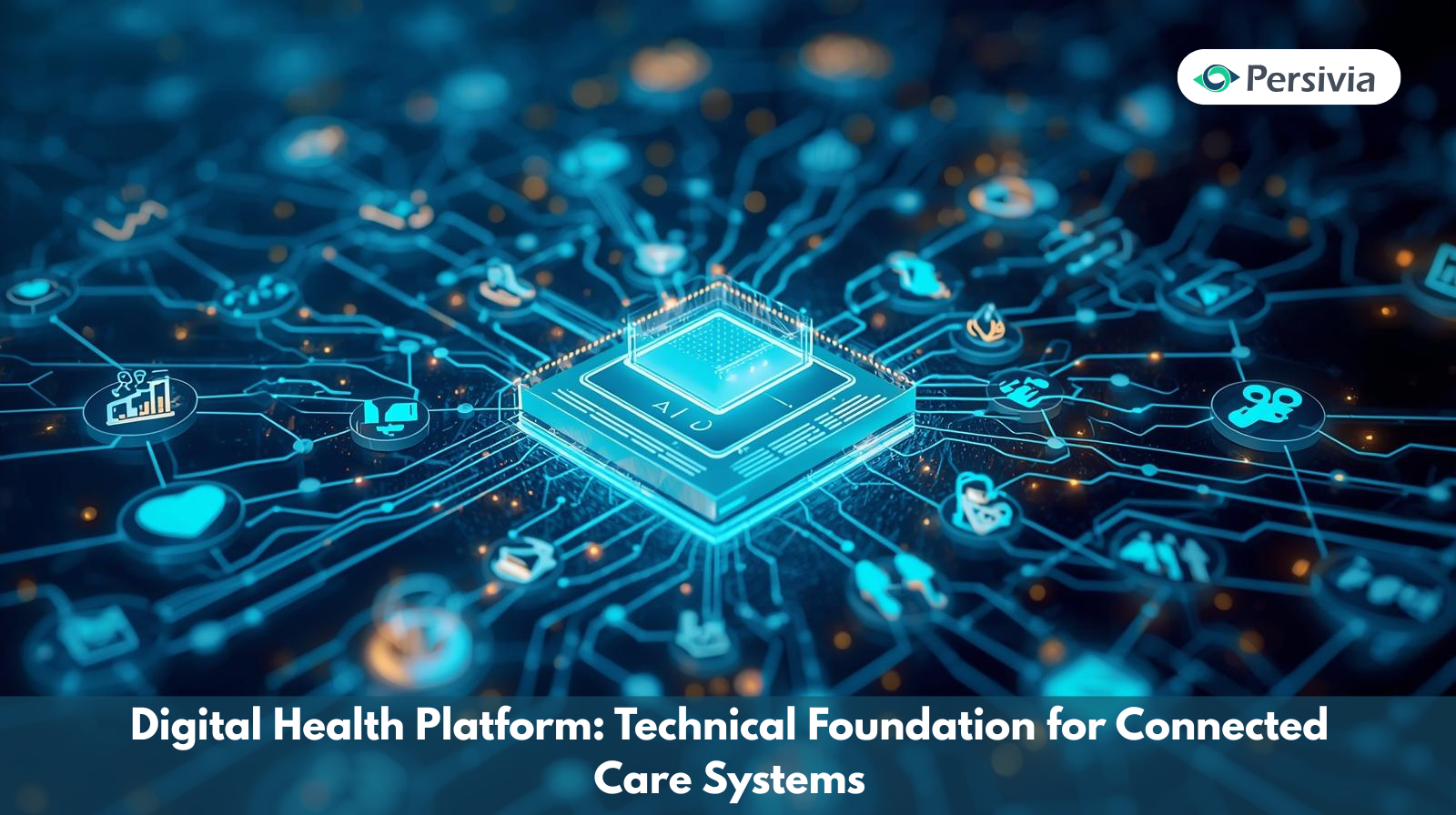Digital health platforms represent all-encompassing technical platforms that combine healthcare data, streamline care delivery, and provide real-time cooperation among providers, payers, and patients. Such AI-based systems are capable of unifying various data sets, automating clinical processes, and providing actionable insights at the point of care to enhance health outcomes at a lower cost.
Imagine a hospital where patient data flows seamlessly across departments, critical changes trigger instant alerts, and treatment decisions are guided by algorithms trained on millions of data points. This isn’t a distant future. It’s the reality that advanced healthcare technology is building today. Yet in most organizations, vital patient information is still locked in disconnected systems and digital silos.
A digital health platform is the technological foundation to convert this disjointed landscape into linked care ecosystems. These advanced systems serve as the central nervous systems of healthcare organizations, which link electronic records, lab results, imaging, and real-time patient monitoring instantly into single intelligence networks. When clinical teams have access to full patient stories, not parts of them, they make superior decisions more quickly- and patients achieve far better outcomes.
What Are Digital Health Platforms?
Digital health platforms are software ecosystems that collect clinical decision-support and care coordination using healthcare data across various sources. These platforms bring together data management, analytics, and workflow automation to form integrated healthcare delivery systems.
Key characteristics include:
- Data aggregation from electronic health records, claims, devices, and patient inputs
- AI-driven analytics that identify patterns and predict health outcomes
- Real-time connectivity with existing healthcare infrastructure
- Configurable workflows adapted to specific organizational needs
- Population health management capabilities across patient populations
Core Technical Components
The technical framework supporting a digital health platform is what makes it as strong as it can be. These are the main building blocks of the connected care systems, and they guarantee the flow of data, smart insights, and effective decision support to healthcare organizations.
Data Integration Infrastructure
Healthcare data can be found in hundreds of sources (EHRs, wearable devices, etc.). This complexity is tackled in modern platforms by powerful data fabric architectures that bind and normalize information streams.
Essential integration capabilities:
- Connection to 100s of home monitoring devices and sensors
- Bi-directional connectivity with major EHR systems
- Claims data processing and normalization
- Real-time data streaming and batch processing
- Metadata catalogs for data discovery and governance
AI-Powered Analytics Engine
The analytical structure converts raw healthcare data into clinical intelligence. Thousands of data points are processed by advanced algorithms to recognize risks, gaps in care, and optimization opportunities per patient record.
Core analytical features:
- Over 1000 evidence-based clinical algorithms
- Predictive modeling for population health management
- Risk stratification and care gap identification
- Quality measure calculations and reporting
- Automated workflow triggers based on clinical criteria
Healthcare AI Integration
Healthcare AI is not merely a simple analytics tool but can be used to provide smarter automation in all aspects of care delivery. Machine learning models are continually improving the accuracy of predictions and workflow.
Modern AI integration includes:
- Natural language processing for clinical documentation
- Predictive analytics for readmission risk assessment
- Computer vision for medical imaging analysis
- Conversational AI for patient engagement and support
- Decision support systems for treatment recommendations
Point-of-Care Intelligence
Patient insights must be accessible to clinical teams as they encounter patients in care. Combined platforms provide detailed patient portals with actionable feedback in the current workflow.
Point-of-care capabilities:
- Complete longitudinal patient records across all care settings
- Real-time alerts for critical gaps in care
- Evidence-based care pathway recommendations
- Quality measure tracking and improvement suggestions
- Risk scores and intervention priorities
Population Health Management
Healthcare organizations are becoming more concerned with how they care for patient populations rather than with experiences. Systematic population health strategies are made possible by platform-based approaches.
Population management functions:
- Patient cohort identification and segmentation
- Care management program automation
- Social determinants of health integration
- Community resource coordination
- Outcome measurement and reporting
Care Coordination Workflows
Care coordination should be efficient with a smooth flow of information among providers, support teams, and patients. Automated processes do not leave any gaps.
| Workflow Type | Automation Features | Impact Metrics |
| Care Transitions | Automated discharge planning, follow-up scheduling | Reduction in 30-day readmissions |
| Chronic Disease Management | Medication adherence monitoring, lifestyle coaching | Improvement in quality scores |
| Preventive Care | Screening reminders, appointment scheduling | Increase in preventive service completion |
Value-Based Care Enablement
The change to value-based payment models requires complex data tracking and outcome measurement. Digital platforms offer the framework that will enable effective value-based care programs.
Value-based care support:
- STAR ratings improvement through targeted interventions
- HCC coding accuracy and documentation support
- HEDIS measure calculation and reporting
- Risk adjustment and quality bonus optimization
- Financial performance tracking and forecasting
Quality Improvement Analytics
The quality of healthcare delivery requires measurement and constant monitoring. The analytics provided by the platforms define the areas of improvement and monitor the progress.
Quality analytics include:
- Clinical quality measures aligned with CMS requirements
- Patient safety indicators and adverse event tracking
- Provider performance benchmarking and feedback
- Care variation analysis to identify best practices
- Outcome prediction models for proactive intervention
Implementation and Integration
Platform implementation must be phased and well planned in order to achieve success. Organizations require dynamic solutions that will be incorporated into the existing systems without interrupting the provision of care.
Implementation best practices:
- Phased rollout starting with high-impact use cases
- Comprehensive staff training and change management
- Data migration and validation processes
- System integration testing and optimization
- Ongoing support and continuous improvement
Technical Architecture Considerations
Performance, scalability, and maintenance requirements are directly influenced by platform architecture. Modern ones focus on microservices based on cloud-native designs.
Architecture elements:
- Scalable cloud infrastructure supporting millions of patient records
- API-first design enabling third-party integrations
- Security frameworks meeting HIPAA and SOC 2 requirements
- Disaster recovery and business continuity planning
- Performance optimization for real-time clinical workflows
Measuring Platform Impact
The success of digital health platforms must be measured on a broader clinical, operational, and financial scale. There are various measures that are followed within organizations to determine the return on investment.
Key performance indicators:
- Patient outcome improvements and quality score increases
- Care team productivity and satisfaction metrics
- Cost reduction through avoided hospitalizations and complications
- Revenue enhancement through value-based care bonuses
- Operational efficiency gains and workflow optimization
Return on Investment Analysis
Healthcare organizations have documented high returns with overall platform implementations. Practical outcomes exhibit quantifiable effects in various aspects.
Documented outcomes:
- Millions of $ in cost savings through care optimization and utilization management
- Growth in value-based care annual recurring revenue
- Decrease in hospital readmissions through coordinated care
- Reduction in 30-day all-cause readmissions for managed populations
- 12-week implementation timelines from contract signing to full deployment
Security and Compliance
Healthcare data security needs to be fully secured and protect all platform elements. Solutions in the contemporary world apply multi-layered security models to meet the changing threats.
Security measures:
- End-to-end encryption for data in transit and at rest
- Role-based access controls and audit logging
- HIPAA compliance monitoring and reporting
- Penetration testing and vulnerability assessments
- Business associate agreements and vendor management
Bottom Line
Digital health platforms create the technical foundation necessary for connected, coordinated healthcare delivery. These comprehensive systems unify data sources, automate workflows, and deliver actionable insights that improve patient outcomes while reducing costs. Organizations implementing robust platforms report substantial improvements in quality scores, care coordination, and financial performance.
Persivia offers a comprehensive AI-driven digital health platform that transforms the way healthcare organizations deliver care. CareSpace® integrates data from hundreds of sources, provides evidence-based clinical insights, and automates care workflows to improve outcomes across entire patient populations. With proven results including millions in cost savings and significant quality improvements for leading healthcare organizations, Persivia delivers the technical foundation your organization needs for connected care success.


